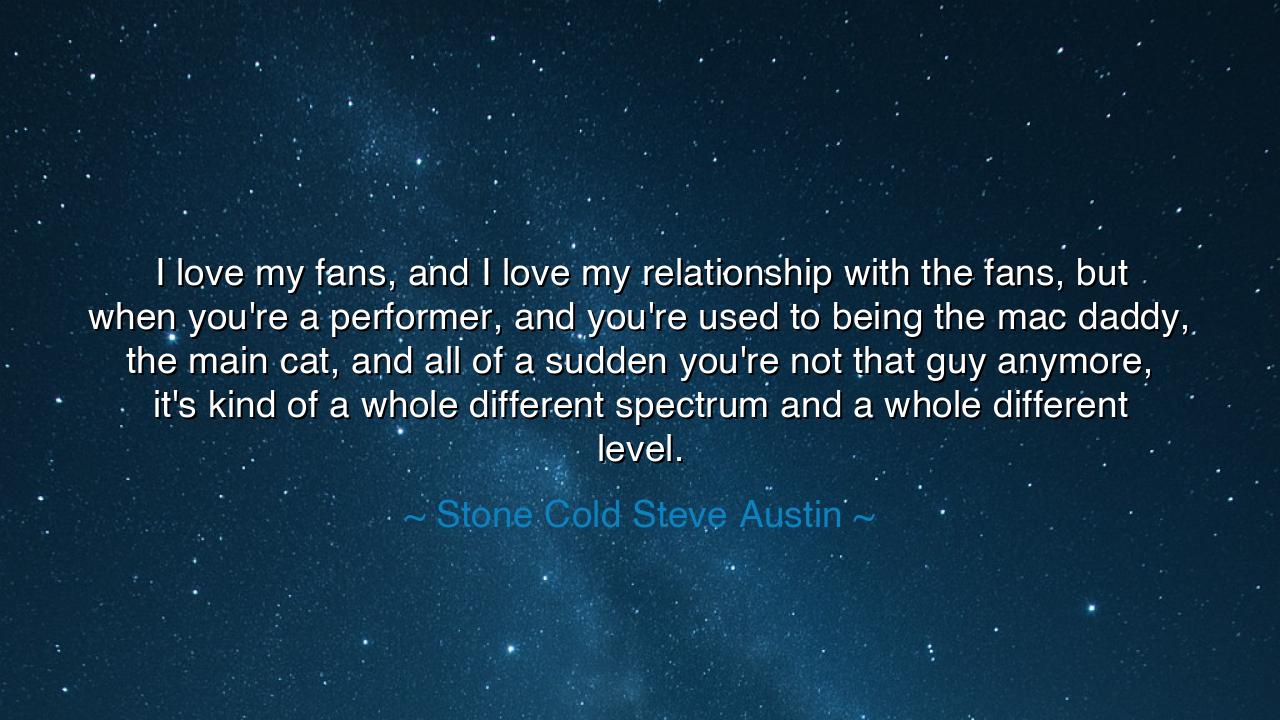
I love my fans, and I love my relationship with the fans, but
I love my fans, and I love my relationship with the fans, but when you're a performer, and you're used to being the mac daddy, the main cat, and all of a sudden you're not that guy anymore, it's kind of a whole different spectrum and a whole different level.






The words of Stone Cold Steve Austin—“I love my fans, and I love my relationship with the fans, but when you’re a performer, and you’re used to being the mac daddy, the main cat, and all of a sudden you’re not that guy anymore, it’s kind of a whole different spectrum and a whole different level”—carry with them the raw honesty of a warrior stepping out of the arena. They speak of the fleeting nature of glory, the shifting tides of fame, and the humbling truth that even the strongest must one day step aside.
The ancients knew this tale well. The champion, once hailed by the crowd, was later replaced by younger heroes. The gladiator, once adored in the coliseum, became a memory when the sands bore new blood. Austin’s words echo this eternal cycle: the performer, who once stood as the central fire of the spectacle, must reckon with a world where the cheers soften, and the mantle passes to another.
Yet there is no bitterness in his reflection—only truth. He honors his fans, acknowledging that the bond between performer and audience is sacred, a covenant built on passion, admiration, and loyalty. Still, he reveals the difficulty of transition: when one has lived as the main cat, the center of light, stepping into shadow requires the courage of acceptance.
This is not a fall but a transformation. To move from being the hero of the crowd to something else—mentor, legend, elder—demands strength greater than the body. It demands humility and wisdom, the understanding that identity must stretch beyond the roar of applause. In this, Austin’s words remind us that true greatness is not only in shining, but in enduring when the light shifts.
So let this teaching be remembered: glory is a gift, but it is not eternal. To tie one’s worth only to being the mac daddy is to suffer when the spotlight fades. Instead, carry the fire inward—let the cheers of the fans live within as memory, and let the new path be walked with dignity. For the ancients knew, and Austin proclaims, that the measure of a life is not only how one rises to the top, but how one walks when the crown is set aside.






DNdth nt
This quote is a powerful reminder of how fame is fleeting, and the identity tied to it can be fragile. Being the ‘mac daddy’ gives a sense of dominance and importance, but when that changes, how does one cope? Stone Cold’s reflection raises an important question: What happens when your career shifts, and you're no longer in the spotlight? Can you still maintain that same love and connection with your fans, or does it evolve into something different?
NLNinh Le
Stone Cold’s perspective on fame and fan relationships feels honest and raw. It’s not just about the fame itself but the shift in how you're perceived, both by others and by yourself. How do you adapt to a new phase in life when the spotlight fades? Do former stars find new ways to connect with their fans, or does the transition from ‘main guy’ to ‘not that guy anymore’ feel like a loss of purpose?
HNHoai Nguyenthu
This quote makes me think about the fragility of fame. Stone Cold’s reflection on his relationship with fans shows how deeply intertwined identity and performance are. How do performers, or anyone in the public eye, navigate a loss of status? When you’re no longer the star, does your relationship with your audience change, or is it simply a matter of adjusting expectations and redefining your place in the world?
ALKim Anh Le
I can relate to the concept of shifting roles, but for performers like Stone Cold, it must be on a whole different level. How do you maintain a sense of self-worth when the very thing that made you successful—being ‘the mac daddy’—no longer applies? It must be hard to find fulfillment after having such an intense connection with fans, and then facing a transition where you're no longer the focal point.
TNTrieu Truong Nam
Stone Cold's words really hit home about the challenges of fame and transitioning away from being the center of attention. The idea of going from being ‘the main cat’ to no longer holding that place in the spotlight must be tough. How do performers cope with this shift in identity when their entire career has been built around being the dominant figure? Is it difficult to adjust, or do they find new ways to redefine themselves?